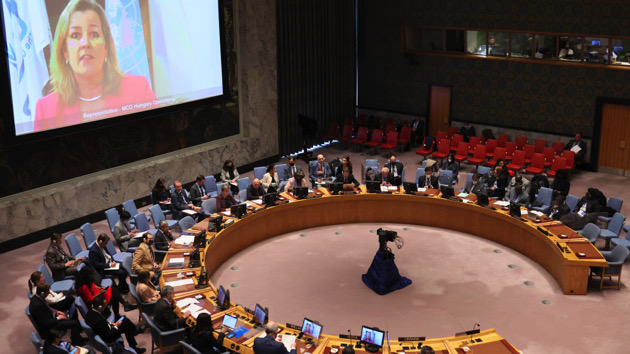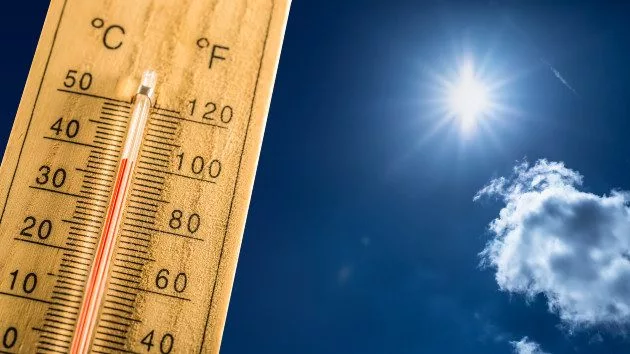
(NEW YORK) — The United Nations Security Council’s lack of action to intervene in the war in Ukraine, with more than one resolution being vetoed by Russia, has resurfaced criticism of the body.
The Ukrainian government has heavily criticized the body for not taking action to stop the war, with strong criticism coming from Ukrainian President Volodymyr Zelenskyy who, in an address to its Security Council, challenged the body to act or “dissolve” itself.
The U.N. General Assembly passed resolutions condemning the war in Ukraine, including a resolution to remove Russia from the Human Rights Council, exposing what little support Russia has for its war and international condemnation for its alleged war crimes.
Historically, when the Council has been unable to take action, the U.N. General Assembly has intervened, experts told ABC News.
The Security Council, a body consisting of 15 members, five of which are permanent with veto power dubbed the P-5, is responsible for peace and security. The remaining 10 non-permanent seats rotate by election of other U.N. members for two year periods. The permanent members are China, France, Russia, the U.K. and the U.S.
This story explores the shortcomings of the Security Council and ways it can be reformed.
Can Russia be removed or its veto power taken away?
Removing a member from the Security Council or the General Assembly requires a recommendation from the Security Council.
Because Russia is one of the P-5 and has veto power, it can block any resolution from being passed, keeping its seat safe. It would be impossible to remove Russia from the council unless it agrees to its own expulsion or suspension.
While there has been wide international condemnation of Russia’s invasion of Ukraine, it could still use its position in the U.N. to serve its domestic interests. Whenever Russia is represented in the U.N. Security Council, it uses the opportunity to sell the war at home, even if the international community does not believe what they are saying, Paul Poast, an associate professor of political science at the University of Chicago, told ABC News in an interview.
“A lot of times, there’s value in being there, even if you’re not getting anything done, just because it’s useful for this domestic political purpose,” Poast said.
Experts agree that is unlikely Russia will be removed, but one expert said it is not impossible.
The U.N. Charter lists the Republic of China as one of the P-5. Experts said this is actually Taiwan, as the charter itself was drafted before the communist revolution in China, Kim Lane Scheppele, an international affairs professor at Princeton who focuses on international law, told ABC News.
The civil war, sparked by the Chinese Revolution in 1948, led to “what had been the government of China [fleeing] to Taiwan. And Security Council membership fled with the government,” Scheppele said.
Taiwan remained a permanent member until 1971 when a General Assembly resolution, pushed for by China, transferred the seat.
“The language of the Republic of China, in the in the U.N. Charter, was reinterpreted to mean that the membership moved from Taiwan to the mainland,” Scheppele said.
This could be applied to Russia as well, given that the U.N. charter lists the “Union of Soviet Socialist Republics” as a permanent member of the Council, not Russia. This could leave room for any of the other former Soviet states to replace Russia, possibly even Ukraine, Scheppele said.
“This is kind of the only option that I can see, legally speaking, for how you could do it,” Scheppele said.
Another expert disagrees, and said that there is no way the seat could be taken away from Russia.
“There’s no direct challenger to take that seat and under the current structure of the U.N., and even the current politics of the U.N. General Assembly, there’s no way that I can envision a scenario where there would be a change of the Security Council to either remove Russia completely or even remove the veto power,” Poast said.
Poast later said, “Removing them from the Human Rights Council, in many ways, is probably about as significant of a change as you can make.”
Limitations of the UN
While experts said the U.N. facilitates diplomacy and keeps the lines of communication open between major powers, the Security Council’s actions are tied to major powers’ interests.
The inequity of the Security Council is that nothing can be done if it opposes what the major powers want, Poast said.
While the Security Council has not been able to pass any resolutions regarding the war in Ukraine or act to stop or prevent it, Poast said taking action is not part of its role. That is why NATO was created; to have a separate union, without China and Russia, allowing Western states to take action.
“One of the big things that drove the process of creating NATO was the recognition sitting around late 1947 [to] 1948, that, from the British and the American perspective, they weren’t going to be able to work with the Soviet Union,” Poast said, adding that the powers needed a separate entity that would enable them to take action. Even in the early days of the U.N., Poast said there were concerns over whether the British, French and Americans would be able to work with the Soviets and Chinese.
This was proven in 1999 when NATO took action in Kosovo, after the Security Council did not act, and again in 2011 when NATO intervened in Libya.
“It’s also a key reason why we’re seeing NATO be very active in this war, because of exactly the fact that the U.N. Security Council has been ineffective in doing anything about this. But in contrast, NATO has been highly effective in trying to do something to support Ukraine,” Poast said.
But, Poast said the U.N. is keeping lines of diplomacy open between the U.S. and Russia, even though their respective Secretary of State and Foreign minister have not been communicating.
“That is still important to be able to have the major powers talking to each other, especially if you go back to the ultimate purpose of the UN, which … is to prevent the major powers from fighting one another, not to keep them from fighting any war,” Poast said.
Another expert said the U.N. has been remarkably effective in preventing wars.
“Before 1945, there were a lot of wars between states and since 1945, there have been very, very few. And the Security Council was designed to regulate war between states and in that sense, it’s been, historically, tremendously effective,” said Lise Morjé Howard, a professor at Georgetown University and president of the Academic Council on the United Nations System.
She added, “there have been a lot of militarized disputes between states that came close to war, or where the war maybe even started. And then the controversy went to the U.N. Security Council, they see a resolution, or decision or some kind of mediation process. Sometimes it’s peacekeeping. And then the war didn’t escalate.”
Howard also said the Council has been able to prevent a great power war from breaking out since its inception after World War II.
Proposed reforms to the Security Council
While Poast thinks a separate entity would be needed to take action, there are several proposals to reform both the UN and the Security Council, including limiting veto power and increasing the number of non-permanent members, both of which would need the consent of the P-5.
As for expanding the number of members, one proposal, known as the G-4, is to give India, Germany, Brazil and Japan permanent seats in the Council, while another proposal is for African countries to be given two permanent seats in the body, according to Howard.
Howard said the G-4 proposal has been popular for the last 10 years, but it could hurt the legitimacy of the Council, which stems from its ability to make decisions.
But, “I, and many other scholars, have argued that if you expand the number of decision makers, you will have fewer decisions on the Security Council,” Howard said.
She added, “That means that they that the council will be less effective at decision making.”
Another proposal, dubbed Uniting for Consensus, is to expand the number of non-permanent members in the Council from 10 to 20, to have more representation in the body. This proposal also suggests that states should be allowed to reapply to be on the Council after their two-year election ends.
Howard said more representation and diversity in the Council could increase its legitimacy.
Alternatively, Liechtenstein, a small country in Europe, has teamed up with more than 50 other countries, including the U.S., on a proposal that would require the P-5 to justify their veto to the UNGA and would trigger public debates in the body.
Scheppele said another way to reform the Council is to subject its decision to approval by the International Court of Justice. The ICJ could rule on whether its decisions are in line with international law, as a way to put some checks on the body.
“If the Security Council does something that the General Assembly believes is contrary to international law, for example, the General Assembly can already, under the charter, refer that question decided by the Security Council to the ICJ,” Scheppele said.
But, enforcement of ICJ decisions would still be a problem and this would not resolve the Council’s inaction, Scheppele said.
While a lot of focus has been placed on the Security Council, Scheppele said the U.N. is a large organization with several bodies heavily involved in Ukraine.
“There’s everything from UNICEF, which is in there, into Ukraine, trying to save kids to UNESCO, which has actually been working with all the museum directors across Ukraine to try to preserve Ukraine’s cultural heritage,” Scheppele said.
She added, “the U.N. is more than the general assembly and the Security Council. And there are probably other pieces of the U.N. that are very actively involved in trying to mitigate the damage from this…the U.N. is a big beast has lots of different wings, and arms and legs, and a bunch of them are involved in the war. It’s just not the Security Council.”
Copyright © 2022, ABC Audio. All rights reserved.





